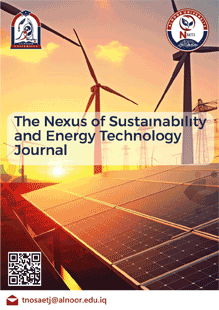
1. The Nexus of Sustainability and Energy Technology Journal
Link to journal : Click Here
Journal Template : Click Here
Scope of Journal :
The scope of NSETJ encompasses a broad range of topics at the nexus of sustainability and energy technology. The Journal of Nexus of Sustainability and Energy Technology welcomes contributions across a wide spectrum of topics at the intersection of sustainability and energy technology. We aim to provide a comprehensive platform for researchers, practitioners, policymakers, and students to share their insights and findings. While not limited to, the scope of NSETJ includes the following areas:
- Sustainable Energy Technologies: We encourage research on sustainable energy generation, storage, and distribution technologies. This includes innovations in solar, wind, hydro, geothermal, and bioenergy systems, as well as advancements in energy storage and smart grid technologies.
- Renewable and Alternative Energy Sources: NSETJ welcomes studies on various renewable and alternative energy sources and technologies, such as photovoltaics, wind turbines, biomass conversion, tidal and wave energy, fuel cells, and other emerging renewable energy technologies.
- Energy Conservation and Efficiency: We invite contributions on energy conservation and efficiency in different sectors, including buildings, transportation, industry, and agriculture. Topics may include energy-efficient technologies, energy management systems, behavioral changes, and energy auditing.
- Technological Innovations for Sustainability: NSETJ seeks research on technological innovations aimed at reducing energy consumption and carbon emissions. This may include advancements in energy-efficient appliances, smart systems, energy-efficient transportation, and green manufacturing processes.
- Environmental, Social, and Economic Aspects: We encourage studies that examine the environmental, social, and economic impacts of sustainable energy technologies. This includes research on environmental sustainability, social acceptance, job creation, economic viability, and the transition towards a sustainable energy future.
- Policies, Regulations, and Strategies: NSETJ welcomes research on policies, regulations, and strategies that promote the adoption of sustainable energy systems. This includes studies on energy policy development, incentive programs, regulatory frameworks, and the integration of sustainability goals into national and international energy strategies.
- Life Cycle Assessments: We invite contributions that employ life cycle assessment methodologies to evaluate the environmental impacts of energy systems. This includes studies on the life cycle of energy technologies, from raw material extraction to end-of-life disposal, considering factors such as carbon footprints, resource depletion, and ecosystem impacts.
- Grid Integration and Resilience: NSETJ encourages research on the grid integration of renewable energy sources and technologies. This may include studies on grid management, energy storage systems, demand response mechanisms, and the resilience of energy infrastructure in the face of disruptions and extreme weather events.
- Climate Change Mitigation: We welcome research on sustainable energy solutions that contribute to mitigating climate change. This includes studies on low-carbon technologies, carbon capture and storage, carbon trading mechanisms, and the role of sustainable energy in achieving greenhouse gas reduction targets.
- Energy Technology Modeling and Simulation: NSETJ invites contributions on modeling, simulation, and forecasting of energy technologies. This includes studies that develop and apply models to assess the performance, efficiency, and environmental impacts of energy systems.

2- Terra Joule Journal
Link to journal :Click Here
Journal Template:Click Here
Scope of Journal:
The Terra Joule Journal encompasses a wide array of topics in energy and water sciences, providing an international forum for disseminating innovative research. Key areas of focus include:
- Renewable energy, including solar, wind, hydro, and geothermal sources
- Hydrogen production methods such as electrolysis, steam methane reforming, and biological processes
- Applications of hydrogen in transportation, including fuel cells and combustion engines
- Developments in materials science that support energy technologies
- Water treatment and desalination innovations
- Exploration of the water-energy nexus in research and practical applications
- Strategies for energy conservation and efficiency
- Fossil fuel utilization and its environmental impacts
- Energy economics and policy formulation
- Advanced technologies in energy storage and distribution
- Nuclear energy developments
- Energy’s impact on both urban and rural development
- Emerging advancements in energy technology
